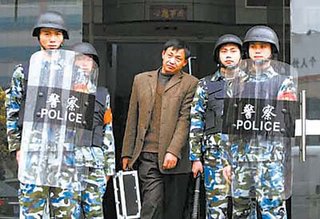The currency in China is called RMB, and the units are called yuan. Six yuan is about equal to one Canadian dollar. Recently, the newly printed currency features the image of Chairman Mao on one side. On some of the older bills, they featured the various different ethnic groups living in China. (I was shocked to find that there are MANY different ethnic groups within China, as the general perception is that we are one homogenous ethnic group.)
My main complaint with money in China was the dependency on physical money. Personal cheques cannot be trusted, due to the skillful arts of forgery and counterfeit in China. Credit cards are not widely accepted in China. If they are accepted, it's usually a Chinese credit card and not Visa or Mastercard or even American Express (so you can actually leave home without it). In a nutshell, if you are in China, you HAVE to use Chinese credit cards. I was able to make a Visa purchase at one of the major shopping malls. This mall was catered to tourists though, and had prices that were well above local standards.
This leads me into a discussion on the current state of the banking system in China. The banking system in China is a bureaucratic nightmare. There are line-ups, and banks have you take a number. The problem is that many people ignore this system and march right up to the tellers while they are serving someone else, and basically get the teller to serve them instead. This was a frequent occurance that I've seen happen at least once every 2 minutes. In North America, such people would be scolded by either the bank staff or the customers, but apparently they are unchallenged in China.
Another problem is with networking bank branches. While all the banks are networked within a city, none of them are networked between cities except for one. Banks also do not regularly handle currency exchanges, except for one. Unfortunately, these banks are not identical. Therefore, if you would like to exchange currency in a strange city and deposit it into your local bank account, you would have to exchange at one bank, and deposit the money in another. In addition, China is very strict about currency exchanges. It's not something that is easy to do, and it requires forms to be filled out. As a result, foreign currency in China is not widely accepted. In a nutshell, if you're in China, you HAVE to use Chinese currency. It's a very smart thing for the government to do, as reinforces the value of currency within China. Unfortunately, it makes things very difficult for tourists.
The dependence on physical money is difficult for business owners as well. Large business transactions may have to be done using paper yuan, which occasionally leads to situations where people with briefcases full of money have to hired guards to protect them as they carry it back and forth.
I was told that some businesses bypass the Chinese banking nightmare by opening accounts with Hong Kong banks. It's not a bad idea, because having guards to escort your briefcase of money around is a pretty silly thing to have to do in a country that's supposed to be the next economic power.
Sunday, January 08, 2006
Subscribe to:
Post Comments (Atom)



No comments:
Post a Comment